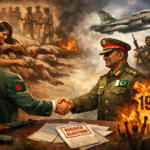The ongoing political crisis in Bangladesh has captured international attention as concerns mount over its rapid descent into instability. Following the collapse of Sheikh Hasina’s government in August 2024, the situation has grown increasingly dire, with far-reaching implications for the region and countries like the UK, which hosts a substantial Bangladeshi diaspora.
A Nation in Turmoil: The Aftermath of Sheikh Hasina’s Fall
Sheikh Hasina’s government, which had been in power since 2009, fell amidst allegations of corruption, authoritarianism, and suppression of political opposition. The abrupt end of her tenure created a power vacuum that has been swiftly filled by competing factions, including Islamist extremists who have gained a stronger foothold in the country. The All-Party Parliamentary Group (APPG) for the Commonwealth has expressed grave concerns over these developments in a report addressed to UK Foreign Secretary David Lammy.
The APPG highlights over 2,000 documented atrocities since Hasina’s ousting, including widespread violence, suppression of dissent, and potential misuse of the legal system by the interim government, now led by Nobel Laureate Professor Muhammad Yunus. The rise of Islamist extremism poses a significant threat to Bangladesh’s secular identity, which has been a cornerstone of its constitution since independence in 1971.
The Role of Extremism in Bangladesh’s Crisis
One of the most alarming aspects of the current crisis is the resurgence of Islamist groups. Bangladesh has a history of grappling with extremist factions, but the political void left by Hasina’s fall has allowed these groups to expand their influence. Reports indicate that militant organizations are exploiting the instability to recruit members, grow their territorial control, and undermine the state’s fragile democratic institutions.
This resurgence is not just a domestic issue; it has significant regional and international implications. An unstable Bangladesh could become a breeding ground for terrorism, threatening the security of neighbouring countries like India and Myanmar. The possibility of extremist activities spilling over into South Asia and beyond raises red flags for global counter-terrorism efforts.
Legal System as a Tool for Revenge?
The APPG report also sheds light on the interim government’s potential weaponization of Bangladesh’s legal system. Allegations suggest that legal mechanisms are being used to settle political scores, targeting opposition leaders, activists, and former allies of Sheikh Hasina’s government. Such actions erode public trust in the judiciary and undermine the rule of law, pushing the country further into chaos.
Treasury Minister Tulip Siddiq, who is related to Sheikh Hasina, has expressed her concerns over the treatment of her family members and political allies in the wake of this crisis. Siddiq’s aunt is the ousted prime minister, and her maternal grandfather, Sheikh Mujibur Rahman, was Bangladesh’s founding president. She has called for an international investigation into the alleged abuses.
Implications for the UK and the Bangladeshi Diaspora
The UK, home to over 644,000 people of Bangladeshi descent (per the 2021 census), is particularly attuned to the unfolding crisis. The Bangladeshi community, concentrated in areas like London, Birmingham, and Manchester, has solid familial and economic ties to the country. Any escalation in Bangladesh is likely to reverberate within the diaspora, potentially affecting community cohesion and raising concerns about radicalization.
The UK government has a vested interest in supporting stability in Bangladesh. Foreign Secretary David Lammy has previously called for a UN-led investigation into the violence and emphasized the need for accountability and democratic reforms. The situation also underscores the importance of proactive engagement in South Asia, a region critical to global geopolitics.
Broader Issues at Play: Corruption, Political Intimidation, and a Fragile Democracy
Beyond extremism and legal weaponization, Bangladesh’s crisis is rooted in deeper systemic issues. Corruption has long plagued the country’s political landscape, with allegations of embezzlement and favouritism eroding public trust. The political culture of intimidation, fear, and force further stifles democratic discourse.
Under Hasina’s rule, critics accused the government of suppressing opposition voices and manipulating electoral processes. These practices have created a volatile environment where political transitions are fraught with uncertainty and violence.
The current interim government faces the daunting task of restoring order and addressing these systemic issues. However, the initial signs are troubling, with reports suggesting a continuation of authoritarian tendencies and a lack of meaningful reforms.
Geopolitical Implications and International Response
Bangladesh’s crisis also has significant geopolitical dimensions. The country’s strategic location in the Bay of Bengal makes it a critical player in regional dynamics involving India, China, and the United States. An unstable Bangladesh could disrupt trade routes, exacerbate refugee flows, and strain diplomatic relations.
India, which shares a long and porous border with Bangladesh, is particularly concerned about the rise of Islamist extremism and its potential spillover effects. The Rohingya refugee crisis, already a significant issue in the region, could worsen if Bangladesh descends further into chaos.
Both China and the US vying for influence in South Asia, have expressed their concerns over the situation. While China has traditionally supported Bangladesh’s infrastructure development, the US has emphasized the need for democratic reforms and human rights.
A Call for International Action
The international community has a critical role in addressing Bangladesh’s crisis. A UN-led investigation into the violence and atrocities could help ensure accountability and deter further abuses. At the same time, global powers must support efforts to strengthen Bangladesh’s democratic institutions, promote dialogue among political factions, and address the root causes of instability.
For the UK, this means leveraging its historical ties with Bangladesh to facilitate constructive engagement. Supporting civil society organizations, fostering economic partnerships, and providing platforms for dialogue within the diaspora can help mitigate the impact of the crisis.
Conclusion: A Pivotal Moment for Bangladesh
Bangladesh stands at a crossroads, facing challenges that could determine its future trajectory. The rise of extremism, misuse of legal systems, and political instability are pressing issues that require urgent attention from both domestic leaders and the international community.
For countries like the UK, the crisis is not just a foreign policy challenge but a domestic concern, given the deep connections between the Bangladeshi diaspora and their homeland. As the world watches, the actions taken in the coming months will be pivotal in shaping the future of this South Asian nation and its role on the global stage.
U.S. President-elect Donald Trump has denounced the “barbaric violence” targeting Hindus, Christians, and other minorities in Bangladesh.
In response to these developments, Indian American physician and community leader Bharat Barai has called for decisive action against the Bangladeshi government over the alleged persecution of Hindus and other minorities. Barai expressed optimism about President-elect Donald Trump’s commitment to addressing the issue, referencing a statement Trump made before the November elections.






